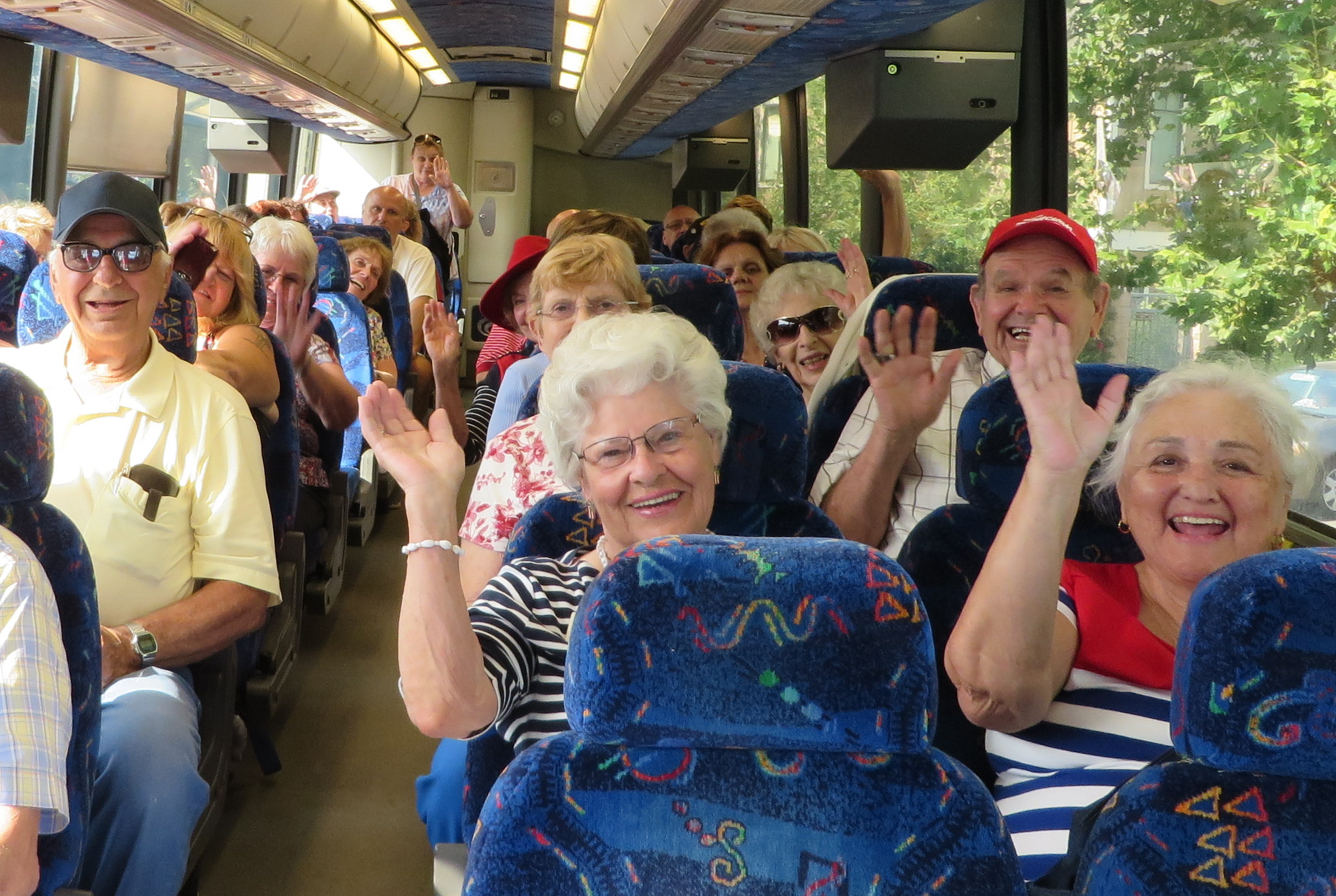Senior bus tours offer a unique blend of adventure and convenience, catering to the specific needs and desires of older travelers. These tours provide a structured yet flexible way to explore new destinations, both domestically and internationally, without the stresses of independent travel planning. From meticulously planned itineraries to comfortable accommodations and accessible transportation, senior bus tours prioritize the well-being and enjoyment of participants, creating memorable experiences that enrich retirement years.
This exploration delves into the key aspects of the senior bus tour market, examining target demographics, popular destinations, essential amenities, effective marketing strategies, crucial safety considerations, competitive analyses, and compelling visual representations of the tour experience. The goal is to provide a comprehensive understanding of this growing sector of the travel industry.
Target Audience for Senior Bus Tours
Understanding the senior travel market is crucial for designing successful bus tour packages. This involves recognizing the diverse needs and preferences within this demographic, going beyond simple age brackets to appreciate the nuances of individual travel styles and expectations. Effective targeting requires a detailed understanding of their interests, financial considerations, and desired travel experiences.
The key demographic characteristics of senior travelers interested in bus tours are multifaceted. Generally, this group comprises individuals aged 65 and above, though the “senior” market is increasingly encompassing those in their 50s and 60s who are actively planning for retirement travel. This segment often includes both couples and solo travelers, with varying levels of mobility and health considerations. Geographic location also plays a significant role, with accessibility to transportation networks influencing participation rates. Furthermore, educational attainment and income levels are relevant factors influencing spending habits and travel choices.
Diverse Interests and Needs of Senior Travelers
Senior travelers exhibit a remarkable diversity of interests and needs. Some prioritize relaxation and leisurely sightseeing, seeking comfortable accommodations and minimal physical exertion. Others actively seek adventure and cultural immersion, eager to explore new places and engage in stimulating activities. Many value opportunities for socialization and interaction with fellow travelers, fostering a sense of community and shared experience. Specific interests may include historical sites, natural landscapes, culinary experiences, or attending specific events like concerts or festivals. Crucially, accessibility needs, including wheelchair accessibility and assistance with luggage, must be carefully considered. The demand for accessible transportation and accommodations is a significant factor in tour design and marketing.
Comparing Preferences Across Senior Age Groups
While generalizations are risky, certain trends emerge when comparing preferences across different age groups within the senior demographic. The 65-75 age group may demonstrate greater physical stamina and a willingness to engage in more active tours, potentially including hiking or longer walking distances. The 75+ group may prioritize comfort and convenience, preferring shorter excursions with more downtime and accessible transportation options. However, this is a broad generalization; many individuals in the 75+ age group remain highly active and adventurous. The specific needs and preferences are highly individual and shouldn’t be determined solely by age.
Ideal Customer Persona: The “Adventurous Explorer”
To illustrate, let’s create a persona representing an ideal customer for senior bus tours. Meet Eleanor, a 72-year-old retired teacher with a keen interest in history and a moderate budget. Eleanor is physically active, enjoys moderate walking, and values comfortable accommodations with easy access. She travels with her husband, Richard, who shares her interests. Their travel style is relaxed yet engaging; they seek well-organized tours with informative guides, opportunities for social interaction, and a balance of structured activities and free time. They are willing to spend a moderate amount on a high-quality tour experience, prioritizing comfort, safety, and cultural enrichment over luxury. Their expectations include clear itinerary details, accessible transportation, and respectful attention to their needs and preferences. They value small group tours, allowing for more personalized attention and opportunities for deeper engagement.
Marketing and Promotion Strategies
Reaching senior travelers requires a multifaceted approach that leverages the channels they frequent and speaks directly to their interests and concerns. A successful marketing campaign must build trust, highlight value, and address potential anxieties related to travel.
A well-structured marketing campaign will utilize a blend of traditional and digital strategies to maximize reach and engagement. Understanding the specific preferences of this demographic is crucial for crafting effective messaging and choosing the appropriate channels.
Print Marketing
Print advertising remains a relevant channel for reaching senior travelers, many of whom are comfortable with and prefer traditional media. Direct mail campaigns, utilizing high-quality brochures and postcards featuring stunning imagery of tour destinations and comfortable travel arrangements, can be highly effective. Advertisements in publications like AARP The Magazine or senior-focused newspapers and magazines can also generate significant interest. These materials should showcase the ease and comfort of the bus tours, highlighting features like spacious seating, restroom facilities, and planned stops.
Online Marketing
A user-friendly website is paramount. It should be easy to navigate, visually appealing, and include detailed tour itineraries, pricing information, and customer testimonials. Search engine optimization (SEO) is essential to ensure the website ranks highly in search results for relevant keywords like “senior bus tours,” “retirement travel,” and specific destination names. Pay-per-click (PPC) advertising on search engines like Google can also drive targeted traffic to the website.
Social Media Marketing
While seniors may not be the most prolific social media users, platforms like Facebook offer valuable opportunities for targeted advertising. Creating visually appealing posts showcasing the beauty of the destinations and the camaraderie of group travel can resonate with this audience. Facebook groups focused on retirement living or travel can be excellent platforms for organic reach. The tone should be positive and reassuring, emphasizing safety, comfort, and the social aspects of the tours.
Crafting Compelling Marketing Materials
Marketing materials should prioritize clear, concise language and easy-to-read fonts. High-quality photography and videography are crucial, showcasing scenic destinations, comfortable bus interiors, and happy travelers. Testimonials from previous customers are powerful tools for building trust and credibility. Addressing potential concerns, such as accessibility and safety, directly in the marketing materials can alleviate anxieties and encourage bookings.
Examples of Effective Marketing Messages and Visuals
One effective marketing message could be: “Discover the world, comfortably and safely, with our expertly planned senior bus tours.” The visual accompanying this message could be a panoramic shot of a stunning landscape, with a comfortable-looking bus subtly featured in the foreground. Another example could focus on the social aspect: “Connect with fellow travelers and create lasting memories on our exciting senior group tours.” The accompanying visual could be a picture of happy seniors interacting on a tour, perhaps sharing a meal or enjoying a scenic viewpoint. A third example could address safety concerns directly: “Travel with peace of mind. Our experienced drivers and meticulously planned itineraries ensure a safe and enjoyable journey.” The visual could be a picture of a friendly, professional driver.
Summary
Ultimately, the success of senior bus tours hinges on a thoughtful understanding of the target audience, a commitment to safety and accessibility, and the creation of engaging and enriching travel experiences. By carefully considering the factors outlined in this discussion, tour operators can cultivate a thriving business while simultaneously providing unforgettable journeys for older adults seeking adventure and companionship. The future of senior travel is bright, promising continued growth and innovation within this specialized niche.




